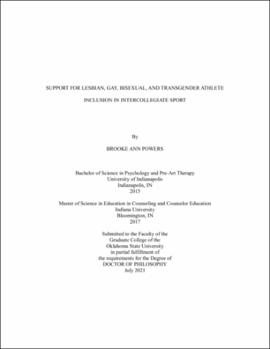| dc.contributor.advisor | Carlozzi, Alfred | |
| dc.contributor.author | Powers, Brooke Ann | |
| dc.date.accessioned | 2022-01-09T19:44:14Z | |
| dc.date.available | 2022-01-09T19:44:14Z | |
| dc.date.issued | 2021-07 | |
| dc.identifier.uri | https://hdl.handle.net/11244/333655 | |
| dc.description.abstract | Within the American inter-collegiate sport setting, athletics is often experienced and labeled as being hostile and unwelcoming for lesbian, gay, bisexual, and transgender athletes (Gill et al., 2010; Rankin & Merson, 2012). Competitive sport remains gender polarized, having only women’s and men’s sport categories while lacking other categories that would provide greater inclusion for gender and sexual minorities. This system creates in-group vs. outgroup dynamics for athletes who do not prescribe to traditional hypermasculinity or cisnormativity in athletics (Gleaves & Lehrbach, 2016). Minimal research, education, and training exists within the topic of including transgender individuals in athletics. Additionally, research has continued to evaluate the support for competing with lesbian, gay, or bisexual athletes, yet there is lacking exploration of how this support might differ for transgender athletes as teammates or competitors (Jenkins, 2009; Raiz, 2006; Woodford et al., 2013). The purpose of this study is to examine current intercollegiate student-athletes’ support for lesbian, gay, bisexual, and transgender (LGBT) athlete inclusion in competitive sport. This will be further explored by identifying the differences in support when LGBT athletes are competing on the same team as the participant and when LGBT athletes are competing against the participant in competition. Levels of support were assessed through participant completion of a demographic questionnaire and Support for LGBT Student-Athlete Inclusion instrument. Analysis of the data included testing for reliability and validity of the instrumentation through principle component analysis and evaluating Cronbach’s alpha, as well as utilizing Chi-Square analysis to test the hypothesizes of the study. Theoretical implications and contributions of the study are discussed. | |
| dc.format | application/pdf | |
| dc.language | en_US | |
| dc.rights | Copyright is held by the author who has granted the Oklahoma State University Library the non-exclusive right to share this material in its institutional repository. Contact Digital Library Services at lib-dls@okstate.edu or 405-744-9161 for the permission policy on the use, reproduction or distribution of this material. | |
| dc.title | Support for lesbian, gay, bisexual, and transgender athlete inclusion in intercollegiate sport | |
| dc.contributor.committeeMember | Hammer, Tonya | |
| dc.contributor.committeeMember | Cole, Ki | |
| dc.contributor.committeeMember | Winterowd, Carrie | |
| dc.contributor.committeeMember | Price, Taryn | |
| osu.filename | Powers_okstate_0664D_16788.pdf | |
| osu.accesstype | Open Access | |
| dc.type.genre | Dissertation | |
| dc.type.material | Text | |
| thesis.degree.discipline | Educational Psychology | |
| thesis.degree.grantor | Oklahoma State University | |
